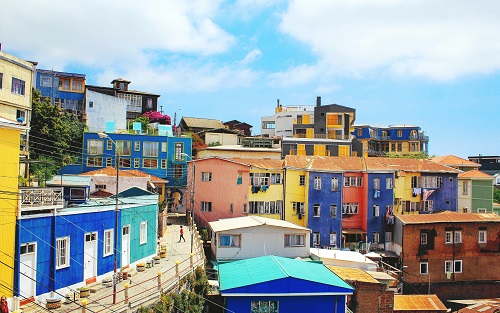Maternity care in Chile is generally of a high standard. The country has the lowest infant mortality rate in the Americas behind Canada and Uruguay. The dedicated Chile Crece Contigo (“Chile Grows With You”) subsystem of the Ministry of Social Development’s social protection system aims to support and protect children from the moment their mother enters maternity care up until they are four or five years old.
Prenatal care in Chile
Chile Grows With You was devised as a response to the recognised inequality in Chile. The programme asserts that ‘inequality begins before birth’, and it therefore begins efforts to increase children’s advantages at the beginning of pregnancy. During your pregnancy, you can attend prenatal workshops and group education classes, and you will be provided with educational materials.
The Chilean Government’s 2015 Perinatal Guide sets out advice and expectations for women and their children, from pre-conception to postnatal and infancy care. Policies and recommendations for prenatal care include:
• Doctors taking a full medical history and making referrals for, and risk managing, conditions, such as epilepsy, diabetes, obesity, cervical and breast cancer, anaemia, tuberculosis, hypertension, and heart disease
• Prescription of folic acid
• A general physical examination recording BMI, blood pressure, and pulse; and a breast exam and a gynaecological exam
• Ultrasounds at regular intervals: 11-14 weeks, 22-24 weeks and 30-34 weeks
• Vaccinations, such as flu and anti-meningococcal
• Electronic fetal heart rate monitoring from around 32 weeks
• Dental care for the mother: 14-20 weeks
Chile follows the World Health Organisation’s (the WHO’s) recommendation of a check-up every four weeks until 28 weeks’ gestation, every two weeks until 36 weeks, and then weekly until the baby is born. Dental care and oral hygiene checks are covered under Chile’s Explicit Health Guarantee (GES), which is legislation guaranteeing service levels and timeliness of care for 85 different conditions.
Where you can be seen will depend on your insurance coverage, so make sure you check which hospitals or clinicas you can attend with your plan.

Giving birth in Chile
The average cost of giving birth in a private hospital in Chile is less than USD $4,000, which can be less than half what you would pay in the US or Canada. Make sure you check whether your insurance policy covers childbirth.
Childbirth is not automatically covered under the public health insurance scheme Fondo Nacional de Salud (FONASA), but if you are considered low risk, you can purchase a Bonus Payment Associated with a Diagnosis (‘bono PAD’) for CLP $278,240 (c.USD $325). This will cover all the fees for health professionals, the cost of a bed, any medications, tests and supplies used during hospitalisation, any necessary histopathologies or biopsies, and post-operative care for 15 days after discharge.
If you are considered high risk – which includes if you are carrying more than one baby, if you have any complications requiring additional treatment, if there are unexpected problems, such as amniotic fluid embolism or thrombophilia, or if you give birth before 37 weeks – you cannot purchase a bono PAD.
If you have private healthcare through one of Chile’s Instituciones de Salud Previsional (ISAPREs), childbirth is likely to be covered, but you should check the specifics and which hospitals you are able to attend.
South America has the highest proportion of C-section births globally, reportedly 42.9% in 2015. Chile’s rate of C-sections increased from 27.7% in 1986 to 44.7% in 2015. Whereas a ‘natural birth’ in some countries denotes a birth without an epidural or pain medication, in Chile it often describes a vaginal birth, with or without pain relief.
Some expats have found that their birth plan was not discussed, and it is therefore worth specifying whether you want a natural/vaginal birth, as it may be assumed that you will want a C-section. There may also be an assumption that you want an epidural, so make sure that you are clear with your doctors about all your desired specifics, and perhaps prepare your birth plan in Spanish, in case the clinicians do not speak English. Take comfort from the fact that Chilean doctors are highly trained, often abroad, and institutions are prepared for every eventuality during labour.

Postnatal care in Chile
Chile offers both maternity and paternity leave. Women with permanent employment contracts are not only entitled to but are actually required to take six weeks’ paid maternity leave before childbirth and 12 weeks after. They will then have a choice of parental leave options. They can either take 12 weeks of subsidised full-time leave or 18 weeks of half-day work after their maternity leave expires.
Fathers are entitled to five continuous working days of paternity leave after their child is born, and they can share up to six of the mother’s 12 weeks of paternal leave or 12 of the 18 weeks of half-day leave.
Mothers are automatically enrolled in the FONASA public healthcare system throughout their pregnancy and until the baby is six months old.
A family report by Unicef found that 41% of infants in Chile are breastfed at six months and 12% at 12 months. This is lower than in several countries, including the USA, Germany and Japan, but higher than in the UK, Canada, France and the Netherlands. Breastfeeding is very socially accepted in Chile and is commonplace in public spaces.
Support from Chile Grows With You continues until the child is around four or five years old. There is a newborn support programme, and children are monitored for early signs of development issues. The Edinburgh Scale is used for early detection of postpartum depression, and there is a benefits programme for the most vulnerable households.
With state of the art care, forward-thinking policies and the added benefit that, provided you are a resident in Chile, your baby will be born with the right to dual citizenship and a Chilean passport, you can be confident that Chile is a great place to have a baby.

